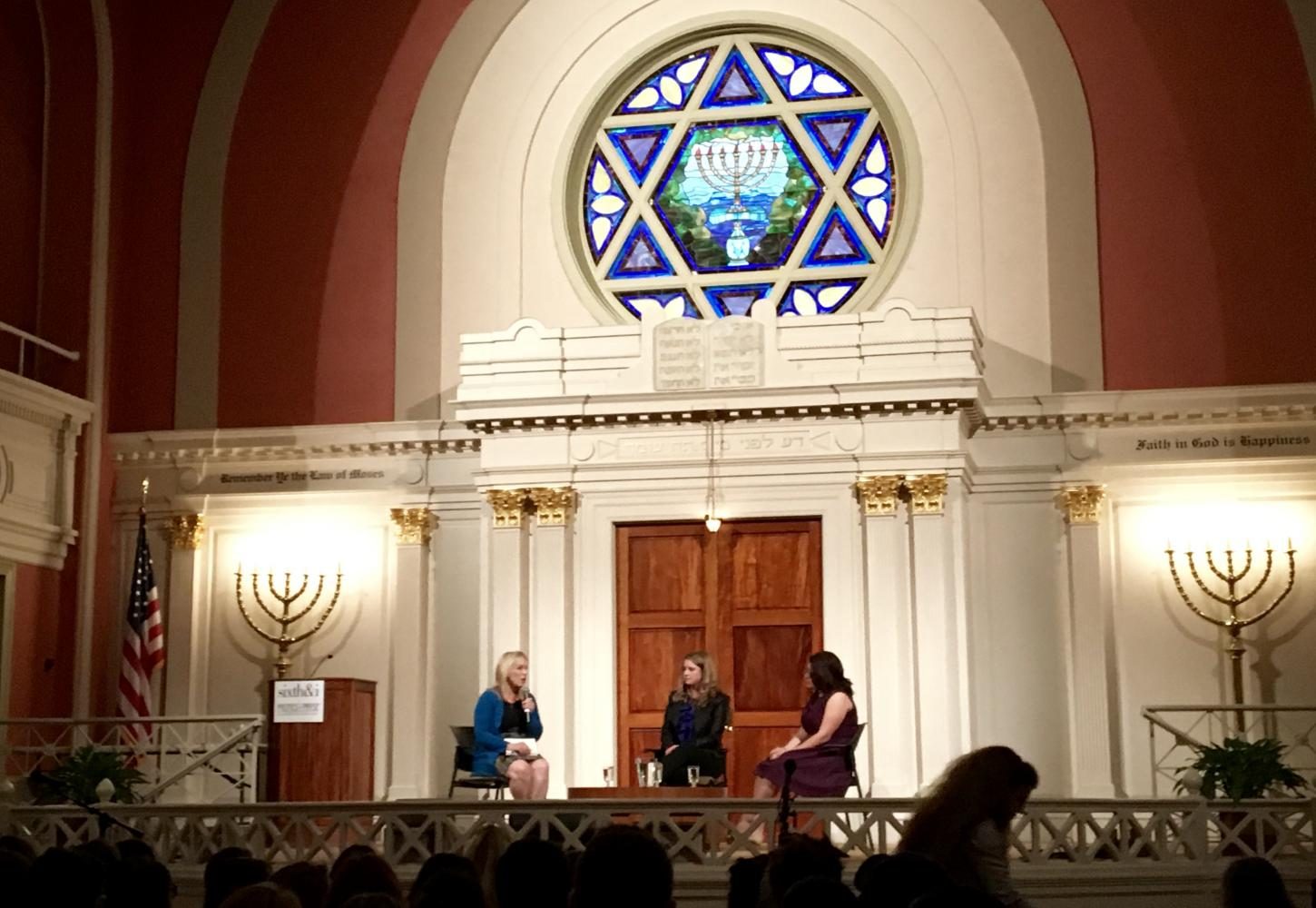We Believe You: Pino and Clark Talk Sexual Assault, Safe Spaces and Consent
Content Warning: Sexual Assault
Society needs to hold the media accountable to tell all types of survivors’ stories, asserted activists Annie E. Clark and Andrea L. Pino.
Clark and Pino discussed their new book, “We Believe You: Survivors of Campus Sexual Assault Speak Out,” with Sen. Kirsten Gillibrand (D-NY) to an audience of about 250 people at the Sixth & I Historic Synagogue on April 13. Politics & Prose Bookstore sponsored the event.
Clark and Pino, both sexual assault survivor themselves, talked about the importance of supporting and hearing the stories of other survivors. They tried to create awareness and solidarity with their book.
“I’ve talked to people here and before about how much this changed in the past three or four years and how much I wished this book would have existed when I was an undergrad,” Pino said. “I really do think this book is transformative.”
With “We Believe You,” Clark and Pino wanted to share real survivors’ stories and “dig into the gaps, into the stories the mainstream media deem not pretty enough to tell.”
“The reality is that there is no perfect survivor, and that has actually been most critical for the movement and for survivors,” Pino said. “Thinking your experience wasn’t bad enough or, you know, ‘I’m not pretty enough,’ or ‘I don’t know his name,’ or ‘I dated him once,’ or ‘I dated him after,’ and the fact is that people are people, and beyond that, assaults aren’t perfect.”
Pino also said that the media mainly covers the assaults of white women, preventing people from recognizing that survivors can be anyone.
“They don’t want to cover racial oppression, they don’t want to cover gender identity, they don’t want to cover sexuality, because it makes it too complicated,” Pino said.
Many of the 34 contributors to the book sat in the front rows of the audience, while other survivors were scattered around the room. Clark called for the event to be a safe space and thanked the contributors who did attend the event, as well as those who could not come forward out of fear of retribution.
“There are people in the audience today who are not sitting in the contributors row because they can’t and don’t feel safe, and I think that’s a reality that we all really need to acknowledge,” Clark said. “So I would ask, if you would feel comfortable, anyone who did contribute to this book, to stand up and just be recognized for your courage, for your voice.”
The audience applauded as over 12 contributors stood up in the front rows.
Gillibrand led the discussion, asking Clark and Pino questions and then expressing her own thoughts. The senator touched on the progress Clark and Pino have made, including working with her to create the Bi-Partisan Campus Accountability and Safety Act.
“When I first met them, it was an issue that was barely discussed,” Gillibrand said. “But because of their advocacy, because of traveling all over the country, their fire and other Title IX complaints with men and women, they’ve been heard and they are changing Congress, they are changing the news media, they are changing people’s perceptions, and they are truly making a difference in so many people’s lives.”
Clark and Pino’s journey began in college, after Pino confided in Clark. Clark told her that she had also been sexually assaulted and Pino replied, “I believe you.” With those three words, Pino was the first person to hear Clark’s entire story of surviving a sexual assault.
Pino and Clark both tried to take anonymous action after their assaults, but did not receive justice. A year later, with each other’s support, the two brought a federal Title IX complaint in 2013 against the University of North Carolina for mishandling cases of sexual assault. They then launched a nationwide campaign to use Title IX complaints to force colleges to be more accountable, visiting survivors across the country in order to hear their stories and try to help them enact change. Their journey was recorded in the 2015 documentary, The Hunting Ground.
Clark and Pino are now the co-creators of the advocacy group End Rape on Campus, which works to stop campus sexual violence through the support of survivors and their communities, education and policy reform. As it stands now, 1 in 5 women will be sexually assaulted in college.
Clark and Pino have strived to create a standard of reporting because survivors are working within two broken systems — the school administrative adjudication process and the criminal process. Clark cited a study concluding that going through the process often hurts the mental health of survivors because they are not believed by the courts.
“Right now there’s research that shows, and this is out of the University of Michigan, that a survivor who goes through a criminal procedure is going to come out with worse mental health outcomes than one who does not report at all, and that’s simply unacceptable,” Clark said. “And so while we’re not here to say, ‘report, or don’t report,’ it’s not a judgment. We want to have a standard and a process for anyone who chooses to do that, that’s going to be fair from every side.”
Clark and Pino believed that the systems are broken partially because of the cultural environment that ignores the importance of consent and says that the survivor could have done something differently to avoid their assault.
“You could have done a billion things differently, but the only person responsible for your assault was your assailant,” Clark said to one survivor of sexual assault. “And that is not your fault. And I’m sorry, and I think, with this book, what we’re trying to do is shift the culture of blame, of shame, and to one holding the perpetrator accountable and his actions.”
Pino called for Sexual Assault Accountability Month to emphasize the need to hold our culture accountable for how we raise children to view sex as conquest while ignoring consent.
“I think a lot of it, is holding our culture accountable,” she said. “Even moving away from Sexual Assault Awareness Month to Sexual Assault Accountability Month. Because we’re aware that sexual assault happens, we’ve always been aware that sexual assault happens. And it is still a very radical act to talk about consent, and talk about women enjoying sex, that’s just something that is not heard.”
For Clark, who grew up in North Carolina where abstinence-only education was a requirement, waiting until college orientation to talk about sexual assault and consent is too late.
“This is happening in our primary schools, this is happening in our secondary schools, this is happening in college, and this is happening after, right?” Clark said. “So we focused on college in this book just to give a snapshot, just to give a microcosm, not because this is the only place that is happening. So I think it is super important that we look much earlier than colleges and also look at healthy relationship education [and] consent education.”
With the Campus Accountability and Safety Act, which is currently awaiting consideration in the Senate Committee on Health, Education, Labor, and Pensions, Gillibrand hopes to strengthen the accountability and transparency of institutions with a mandatory survey every two years that every college student will fill out. The act will also establish penalties for not complying with the legislation’s standards for training, data, and practices.
“Then you will have a snapshot on every college campus [and] what the climate’s like,” Gillibrand said. “And that kind of feedback will change the dynamic immediately.”
According to Pino, school accountability is extremely important, as there are currently 124 colleges and 40 school districts with Title IX complaints. At one point during the talk, Pino asked how many of the audience’s schools are under investigation. About 50 people from the audience raised their hands.
“So the reason I say this is because… a lot of your schools are under investigation, the list changes every day,” Pino said. “What we’ve seen is often perpetrators will leave schools, all the more to do it again, and whether the schools knows about it or not… What we’ve seen is that there’s more of a deterrence for coming forward than there is for actually raping someone. And unfortunately that’s not going to change until we create a culture of accountability.”
Clark said that everyone has a role to fight against sexual assault on campus. However, she also stressed the “radical” notions of self care and the idea that survivors of sexual violence should not be responsible for stopping sexual assault.
“Activism takes many forms,” Clark said. “That could be a protest and that could be getting out of bed. And if that’s what your activism is that day, then good for you. And so moving forward, we need more people, we need allies, we need this conversation to move outside of Sixth and I… And we need cultural change and we need legislative change… But you cannot legislate all of cultural change. That takes you.”
Gillibrand said that no matter how many people try to subvert their efforts, survivors of sexual assault need to be heard and they will not go away.
“And the most important advice I can give you is to stay as strong as you can possibly be, never give up, and try to have as much perseverance that you can because nothing is quick,” Gillibrand said to the mother of a survivor. “Nothing is easy. It’s long. It’s hard. But if we stay fighting, if we stay standing, if we don’t let ourselves be marginalized, be minimized, we will win this fight. It just will take time.”

Senior studying journalism and women, gender, and sexuality studies. Went kayaking with seals in Vancouver this summer and traveled to 12 countries while...







